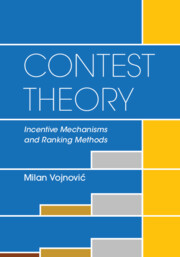Book contents
- Frontmatter
- Contents
- Preface
- 1 Introduction and Preview
- 2 Standard All-Pay Contest
- 3 Rank-Order Allocation of Prizes
- 4 Smooth Allocation of Prizes
- 5 Simultaneous Contests
- 6 Utility Sharing and Welfare
- 7 Sequential Contests
- 8 Tournaments
- 9 Rating Systems
- 10 Ranking Methods
- 11 Appendix
- References
- Index to Notations
- Index
Preface
Published online by Cambridge University Press: 05 January 2016
- Frontmatter
- Contents
- Preface
- 1 Introduction and Preview
- 2 Standard All-Pay Contest
- 3 Rank-Order Allocation of Prizes
- 4 Smooth Allocation of Prizes
- 5 Simultaneous Contests
- 6 Utility Sharing and Welfare
- 7 Sequential Contests
- 8 Tournaments
- 9 Rating Systems
- 10 Ranking Methods
- 11 Appendix
- References
- Index to Notations
- Index
Summary
Contests are systems in which participants, whom I refer to as players, invest efforts in order to win one or more prizes. A distinctive feature of a contest is that each player invests effort but may not be awarded a prize. This makes the area of contest design a subset of auction theory where the aim is to design an auction that achieves a desired goal without necessarily restricting the design to one in which everybody pays. The area is also different from that of mechanism design where the goal is to design a mechanism that optimizes a given objective subject to the constraint that the mechanism is truthful, i.e., players truthfully report their private information. In general, no such constraint is imposed for a contest design problem, and in fact, many contest designs are non-truthful. Another important feature of a contest is that contestants are rewarded with respect to their relative performance, e.g., allocating an award to the best performing player or based on the rank of individual production outputs. This is different from traditional compensation schemes based on some estimate of absolute performance output. The theory of contest design has been developed over the last hundred years or so; in the early days it was predominantly studied in the areas of statistics, political economy and public choice, and the research was motivated by the need to understand and study various competitions, such as sport competitions, rent-seeking, lobbying, conflicts, arm races, R&D competitions, and, more recently, online marketplaces and resource allocation mechanisms. The development of the theory and experimental evaluation have been especially advanced over recent years in the areas of theoretical computer science and management sciences, fueled by the needs of various applications in the context of Internet online services. Here we find a wide variety of contests offering either monetary rewards or reputation. For example, soliciting solutions to tasks through open calls to large communities, so-called crowdsourcing, has emerged as a method of choice for solving a wide range of tasks, including web design, software development, algorithmic and data mining challenges, and various other tasks that require human intelligence.
This book was written to provide an exposition of some of the central concepts in contest design. It should be accessible to any senior-level undergraduate and graduate student equipped with a basic knowledge of mathematics and probability theory.
- Type
- Chapter
- Information
- Contest TheoryIncentive Mechanisms and Ranking Methods, pp. xiii - xviiiPublisher: Cambridge University PressPrint publication year: 2016



